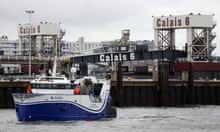British fishing fleets will be allowed to catch greater quantities of cod, haddock and sole next year, after Europe’s ministers approved a new fishing quota that will cheer fish and chip shops but has alarmed scientists concerned over dwindling stocks.
The European Union’s fisheries council reached an agreement in the early hours of Wednesday morning, in what may be one of the last such quota divisions in which the UK takes part if supporters of a hard Brexit have their way.
Scientists warned that the EU catch limits for 2017 were above their recommendations, in contravention of the reforms to the common fisheries policy that are supposed to ensure levels of catch are sustainable by 2020. Nearly two-thirds of European fish stocks are overfished and 85% are below healthy levels.
UK fishing fleets will be allowed to catch 16.5% more cod in the North Sea, along with 17% more whiting, 20% more anglerfish and more than half as much saithe – pollock – as before. In the Irish Sea, they will be allowed to take a quarter more haddock and 8.6% more langoustines, while the Western Channel will yield an additional 7% on haddock and a fifth more sole.
George Eustice, the strongly pro-Brexit fisheries minister, lobbied forcefully against cuts to quotas that were proposed by the European commission on scientific grounds.
He said: “To deliver a profitable fishing industry, we must fish sustainably now and in the future. This year we were able to agree further increases on some valuable species. There have been challenges, especially on stocks like bass and cod in the south-west, where action to curtail catches have been necessary.”
Sea bass fleets have had their catch reduced by 80%, and fishers of cod in the Celtic Sea have also seen a drastic reduction in their allowed take.
Eustice said the resolution struck “the right balance that delivers both for our marine environment and coastal communities”.
He also looked forward to a post-Brexit future for UK fisheries, saying: “As we prepare to leave the EU we have an opportunity to build on progress made and improve the management of fish stocks in our waters, but we will continue to follow the principles of fishing sustainably and ending the wasteful practice of discarding fish.”
Fishing became a flashpoint in the political campaigns before the EU referendum, with a flotilla sailing up the Thames in support of Brexit sparking a heated confrontation between Nigel Farage and Bob Geldof. Supporters of Brexit said it would give the UK’s fishing fleets greater rights over the potential catch, but politicians in favour of remaining argued that the UK would still have to enter tough negotiations over its catch because all of its major fishing grounds are shared with other countries.
Lasse Gustavsson, the European executive director of Oceana, accused ministers who agreed the new quota of ignoring science in favour of short-term interests. He said: “The consequences of today’s irrational decision will live longer than the ministers’ political mandates. Half of Atlantic stocks are already overfished and overfishing will now continue into 2017. It is difficult to understand why ministers fail to see the great opportunity of fish recovery for EU fishermen and citizens alike. Rebuilding stocks will create more jobs in the fishing industry and provide more healthy food for European tables. Why is that not a political priority?”
The European commission said the agreement brought 44 fish stocks in the EU to sustainable levels. Karmenu Vella, the environment commissioner, said: “We have taken another important step towards sustainable fisheries, a core objective of the EU common fisheries policy. I am proud to say our push for healthy fish stocks is starting to pay off.”










